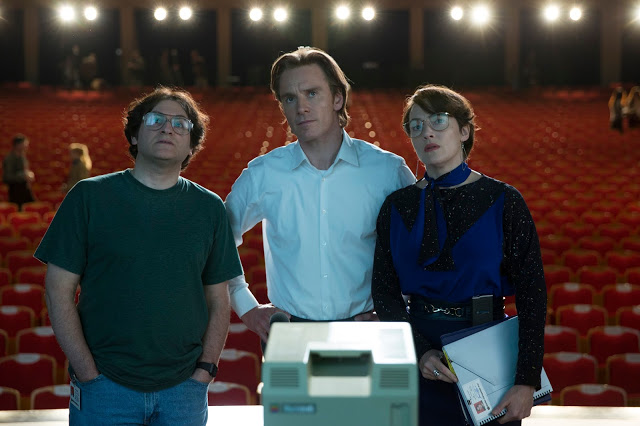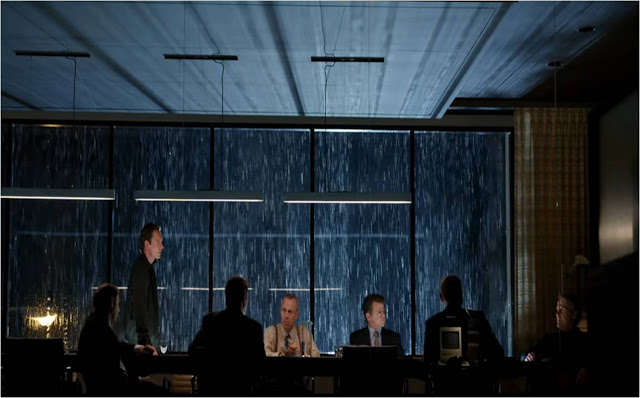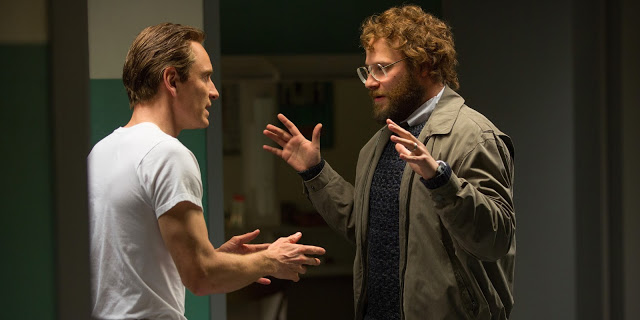Steve Jobs was undeniably a great man, but was he a good one? That question, along with many others—What is the true purpose of technological innovation? Why did the Macintosh look like it was grinning? Is that really Kate Winslet?—is tackled forcefully and adroitly in Steve Jobs, Danny Boyle’s exhausting, exhilarating biopic of Apple Computer’s founding father. A portrait of an artist as an obsessive young man, this manic, mostly marvelous movie wisely sidesteps the unconquerable challenge of condensing Jobs’s entire adult life into a two-hour film. But while its scope is sensibly narrow, Steve Jobs nevertheless allows you to glimpse the magnitude of its subject’s vision, and to feel the intensity of his longing. It is not another generic movie about a tortured genius; it is wholly its own movie about this tortured genius.
Speaking of troubled smart people, the screenplay for Steve Jobs is by Aaron Sorkin, which practically makes it a clandestine autobiography. (In fact, it is a loose adaptation of a book by Walter Isaacson.) Perhaps America’s preeminent wordsmith, Sorkin is renowned for creating characters who are brilliant, driven, and insufferable—you know, kind of like Aaron Sorkin. It’s small wonder he wanted to write about Steve Jobs, who is portrayed here, in a fantastic performance by Michael Fassbender, as equal parts visionary, egomaniac, genius, and jerk. The German-born Irish actor, who appears in every scene in the film, is blessed with a colossal screen presence (recall his magnificently loathsome turn in 12 Years a Slave), and he is effortlessly hypnotic in front of the camera. But there is more to Fassbender’s performance than sheer charisma—every narrowing of his eyes, every curl of his mouth, conveys a precise combination of intelligence and condescension. The Jobs we meet here isn’t just a man with a prophetic plan; he’s a higher power who’s so convinced of his superiority, he can’t help but look down on humanity with despair and disgust.
Whether this narcissistic behemoth accurately resembles the real Steve Jobs is a matter of some consternation among many viewers. Boyle and Sorkin couldn’t care less, and their disdain reflects not arrogance but filmmaking savvy. Those who demand objective truth from works about real-life figures ignore a larger, more cinematic truth: Objectivity is the enemy of personality, and all great art must be personal. The goal here is not to paint a complete and impartial picture of Jobs’s life, much less to appease fact-checking pedants. Rather, the desire—as it is with all ambitious drama—is to make a compelling film with a richly developed central character and an engrossing point of view. In other words, Steve Jobs was a man; Steve Jobs is a movie.
And a bold one at that. As a writer, Sorkin is best recognized for his rat-a-tat dialogue—the way his characters inhale words like they’re oxygen, as if to be silent is to face death—but his nerviest gambit here is on a macro level. The movie, in its entirety, comprises three scenes, each taking place immediately before a heavily publicized launch of one of Jobs’s inventions. The first occurs in 1984, with Jobs—fresh off Apple’s legendary anti-IBM Super Bowl spot—poised to unveil the Macintosh, the machine he was convinced would change computers forever. (In this segment, Fassbender’s slicked-back hair is reminiscent of Christian Bale in American Psycho, an inadvertent reminder that Bale was once attached to the project.) The second takes place four years later, after Jobs’s ouster from Apple; he has since founded NeXT and is prepping to launch that fledgling company’s lustrous Black Cube. (You remember the Black Cube, don’t you? Neither do I. That’s kind of the point.) And the third jumps to 1998, following Jobs’s triumphant return to Apple, as he introduces the famous iMac, that brightly colored contraption that dotted every college campus at the turn of the millennium.
If you think that sounds simple and functional, you’re only half-right. There is a sleek and streamlined quality to Steve Jobs, which makes it feel both immense and self-contained. (Gratifyingly, there is no laudatory end crawl distilling the remainder of Jobs’s life; when the final scene ends, the credits simply roll.) But remember that this is a Danny Boyle film. The red-blooded maker of Trainspotting and Slumdog Millionaire is not known for his restraint, which marks him as a curious choice to direct a Sorkin script, where words tend to predominate over action. But even if Steve Jobs does not produce as sublime a partnership as did The Social Network—in which David Fincher brought Sorkin’s clinical wordplay to exacting and visceral life—it nevertheless presents an intriguing contrast between writer and director. Boyle is all about speed, so in addition to the three primary scenes, he splices in sudden flashbacks, along with a pair of lightning-fast montages following the first two product launches. These bursts of montage, which do a remarkable job delivering compressed information without feeling overly expository, feel like jazzy intermissions between the three acts of an elaborate, real-time stage play. They afford Boyle greater freedom to toy with the frame, lending the proceedings some welcome visual snap; he’s especially fond of using floating text to communicate critical data, a familiar but effective device. Similarly, the flashbacks feel more filmic, most memorably in a stunning shot of Jobs standing in a boardroom, surrounded by seated figures in silhouette, the rain streaming down beyond the floor-to-ceiling windows like thunderbolts of cosmic rage.
But despite Boyle’s flourishes (which are goosed by Daniel Pemberton’s twitchy, pulsating score), the dominant personality here remains Sorkin’s, which means the characters mostly do two things: They walk, and they talk. Steve Jobs is essentially a series of sharp, heated conversations, all involving Jobs. He’s typically fencing with a single foe, but sometimes he spars with multiple partners at once, the words pinging around the room like a crazed game of triangular table-tennis. There is a musicality to the dialogue suggestive of symphonic composition—it’s no accident that Jobs smugly explains, “Musicians play their instruments, I play the orchestra”—and to watch these characters sling insults back and forth is to indulge in a beautiful and cerebral ballet. Yes, there is slightly artificial element to the banter, but that’s somehow appropriate for a movie about a man more comfortable with machines than with people.
About those people: There are many of them, all played by excellent actors (a top-flight cast is a prerequisite for any Sorkin film), and they are all angry at Jobs about something or other. The most poignant such antagonist is Steve Wozniak (Seth Rogen, perfectly cast), Jobs’s enduring confederate whose wide-eyed admiration gradually curdles into contempt. The tragedy of their doomed friendship is mirrored by Jobs’s relationship with his former mentor, John Sculley (Jeff Daniels, star of Sorkin’s much-maligned, underrated HBO show The Newsroom), whom Jobs accuses of betrayal. He is at least nicer to both of them than he is to his ex-girlfriend, Chrisann Brennan (Katherine Waterston), whom he denies having fathered a child with, and whose erratic behavior is unlikely to silence critics who accuse Sorkin of misogyny. On the lighter side is his rapport with the two Andys: Hertzfeld (Michael Stuhlbarg), an engineer who good-naturedly suffers Jobs’s wrath, and Cunningham (a very good Sarah Snook), his loyal assistant who provides some of the film’s warmest moments.
Jobs’s relationships to each of these characters are established quickly and efficiently, and all of them possess a tangible emotional texture that suggests a deeper, more complex dynamic which could be the subject of its own film. But they are also virtually incidental when compared to Jobs’s strained and mutating bonds with two different women. The first is his “work wife”, Joanna Hoffman (a tremendous Kate Winslet), the tsk-tsking ego to Jobs’s rampaging id. Joanna bears the brunt of Jobs’s perpetual irritation—she is constantly reassuring him, while he is always ordering her around—but she also seems to be the only person he actually respects. “Go put a dent in the universe,” she tells him affectionately before the Macintosh launch, echoing one of his own pet sayings. Joanna’s fundamental decency is crucial to a film as volatile as Steve Jobs, and Winslet—armed with a Frau Farbissina wig and a convincing Polish-Armenian accent—turns her into a quietly heroic character without once demanding our attention.
If Joanna features hidden depths not found on the page, the reverse is true of Lisa, Jobs’s daughter (played by Makenzie Moss as a precocious 5-year-old, Ripley Sobo at 9, and Perla Haney-Jardine at 19), whom the screenplay strives to emphasize as the most important person in his life. It’s a noble sentiment that makes intellectual sense; if you’re worried your protagonist will come off as a monstrous demon, you can soften his edges by having him grow to appreciate what really matters. But Sorkin overdoes it. Lisa comes off as a construct rather than a person, and while the early interactions between her and Jobs are deeply moving (Moss is especially good at articulating the young Lisa’s earnest, confused sweetness), the third-act catharsis—which is presented as a cresting emotional moment—falls flat. It’s ironic that only by trying so hard to humanize Jobs does the film make him feel inhuman.
But if Steve Jobs ends on a sweetly sour note, that in no way compromises its overall electricity and passion. There have been movies about Steve Jobs before (in addition to the already-forgotten Ashton Kutcher biopic, television gave us Pirates of Silicon Valley in 1999, starring Noah Wyle as the Apple founder), but this one feels truly worthy of its subject—scarily smart, flawed, and fearless. It is undeniably imperfect. But in its bracing execution and ambition—its riveting dialogue, its note-perfect acting, its audacious construction—it pays fitting tribute to its subject: It puts a dent in the universe.
Jeremy Beck is the editor-in-chief of MovieManifesto. He watches more movies and television than he probably should.



